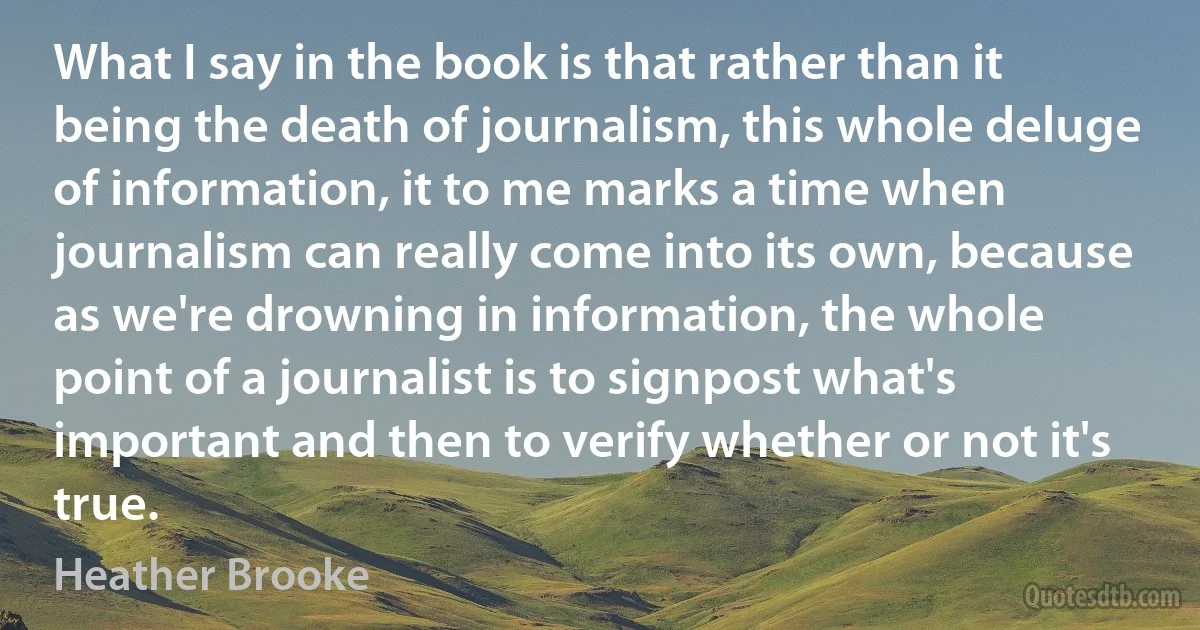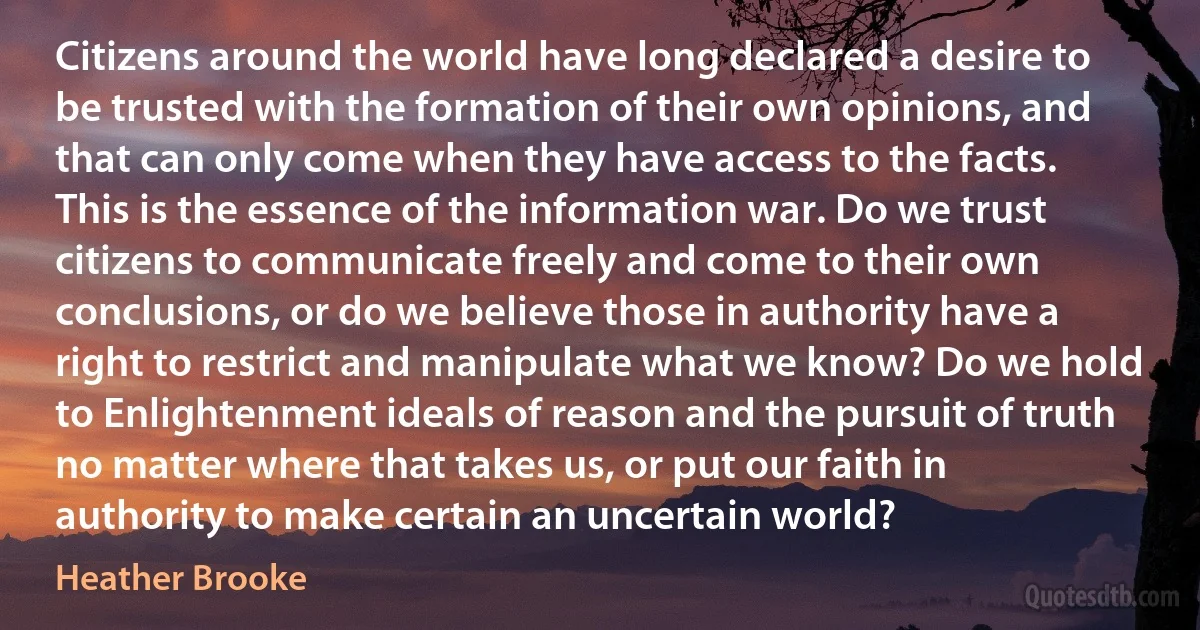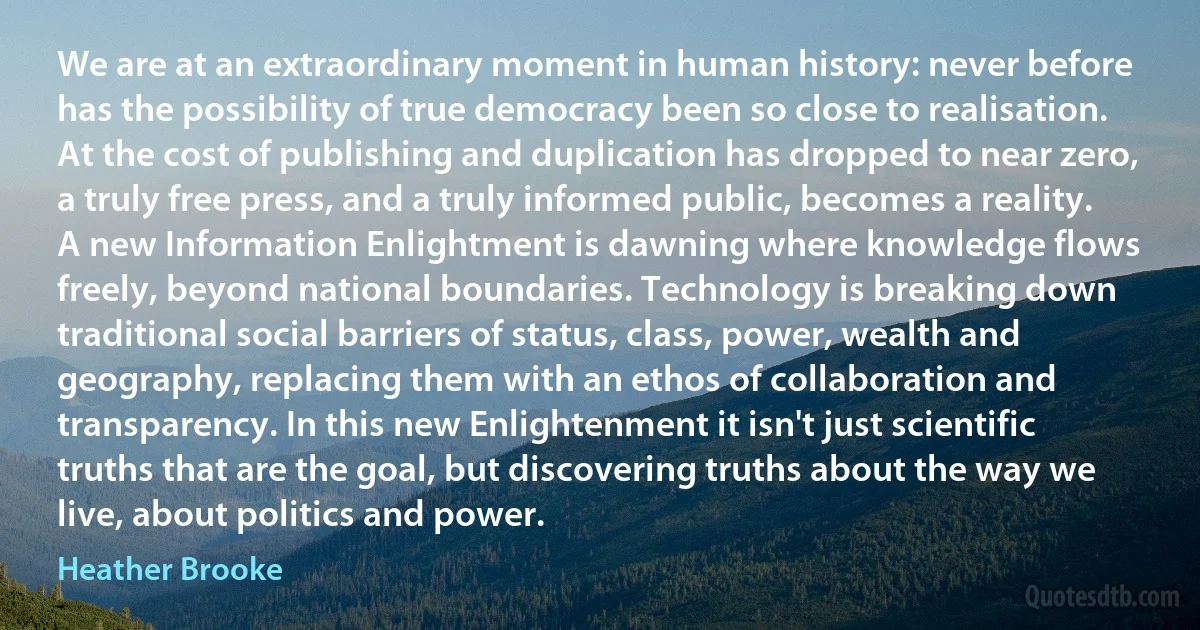Information Quotes - page 92
I'm very much a free market capitalist, actually. I don't agree with a kind of totalitarian, one government or sort of universal law. I think what will happen and what is happening now is, in the same way as... In the way that countries make themselves attractive to investors through different pieces of legislation they offer, whether it's secrecy in the case of the Cayman Islands or Switzerland, I think the fact that some countries now are offering very robust publishing laws, it will be that as information is global, what you might see is that these big internet companies like Google or Facebook, that have their servers, will start to relocate those servers to countries where they have less interference. In a way, you're creating a kind of free market of freedom of information law.

Heather Brooke
This is where we get into the information war - that speculative blood became more important than the actual blood. We already can see all that terrible stuff – we know about that. Let's focus on your nightmares, how all these people might die because the government's secrets have been unleashed.

Heather Brooke
The powerful have historically tried to impose their will through mechanisms of enforced ignorance such as censorship, secrecy, threats, physical intimidation and violence. This model is difficult to sustain in a networked world based on Enlightenment values. This is not to say that Western democracies have abandoned these heavy-handed tactics, but more often the methods have shifted to more sophisticated ways of maintaining power such as media management, public relations and legal intimidation. In the midst of all this information and misinformation how can we filter out what is important and true?

Heather Brooke
To be successful, a campaign to maintain the free internet and freedom of information has to go beyond vandal hackers. Stunts designed not to provoke dialogue or persuade the public of the rightness of the cause but simply to throw up a middle finger to authority are more hindrance than help.

Heather Brooke
The main thing, if there is a power that the media has, it's mostly because they represent the public in quite a direct relationship. They're very populist in the sense that they are meant to be the public's hired goons who go out, find information, collate it all, verify whether or not it's true, and then signpost to the citizens that this is worth reading. And they make it in such a way that it's interesting to read. So they are kind of spokespeople for the people. And in an interconnected age, they are definitely quicker to realize the way power has shifted. You find most journalists now are on all these social networks. They're all about creating... they want a direct relationship with their audience, in a way that politicians have been very loathe to do.

Heather Brooke
At a time of information overload, good journalists are more important then ever. They serve as the public's hired guns to collect information from various sources and challenge it for the purpose of distilling down what is important and true. They-signpost issues that are worthy of our attention. In the past when we bought newspapers we were paying for that particular newspaper with its content- a bundle of news and entertainment. In the digital age we're buying the carriage (e. g. the Internet access) and readers decide later what information they want to view over that carrier.

Heather Brooke
The point about digitization, just to explain what I mean by that, is the way that information is no longer a physical commodity. It doesn't have a mass like it used to. So it used to be that if you wanted to leak a bunch of documents, you physically had to carry away these huge boxes of documents and then you had to physically photocopy them somehow. And they had this physical mass, and it was through that mass that they could be controlled by people in power. When information is digitized, it loses that mass for the most part. It becomes almost ephemeral, it's like an idea; it's like a thought. And it spreads and it can be shared almost instantaneously. So you can take that, and then you combine it with the internet, which is this web in which everybody is talking to each other and sharing information. And you've got the makings of what I think is a digital revolution, which nobody quite knows how to handle it, what to do with it.

Heather Brooke
I'm talking of the revolutionary quality of digitization. And I say it's revolutionary because once information is no longer a bunch of box files or papers in a filing cabinet but just bits that fly through the air, it means that it's so hard for people in power to control it. And it's always been true that knowledge is power. And so once it becomes very difficult for people in power to keep hold of information it means that it becomes very hard for them to keep hold of power, because power just flows out. The default now is zero cost for information to spread instantly around the globe. And in fact you have to pay money to stop it now. That's incredibly disruptive and revolutionary.

Heather Brooke
Maybe you would prefer not to be bothered with how the government is run. If that's the case then you have no right to complain when your taxes are raised, or if your children's education is substandard, or you have to wait a year for a vital operation. Good government does not happen by itself but is the result of individual effort. One of the easiest and most effective things you can do is simply to ask for information. I hope I've given you the tools and confidence to do exactly that.

Heather Brooke
We've come up with ways to judge the quality of a product. The thing is that we're just getting used to the idea that information is a product, and we have to come up with criteria on which to judge which information is worth paying attention to and taking seriously and which isn't. So we have to think: is this information new? Is it relevant? Is it trustworthy? Can I verify it? Who's the source? If you're a journalist you're used to doing this as your job, but that's going to become increasingly necessary for people online, because they just get hit with so much information, and if they don't want to just sit there, manipulated by all different kinds of propaganda, they have to start getting tooled up on how to be a savvy information consumer.

Heather Brooke
Journalists are, or ought to be, the public's hired guns sent out to collect information, question it, verify it and distil it to what is important and true. This takes time and skill, and is the only thing a journalist does that marks him or her out as a professional. It's also the reason why anyone would choose well-known newspaper's website over an unknown blog.

Heather Brooke
Transparency strengthens democracy only when it gives citizens information they can use. It is not just about politicians telling us what they want us to know. For it to mean anything, it must empower citizens and provide answers to the questions they ask, not merely spoon feed them meagre information rations.

Heather Brooke
Leaks have happened before. They are not new. But the industrial scale of leaking made possible through the digitisation of information and the ability to communicate instantly across the globe - that is new. If it is to be revolutionary, however, we need a model for a new type of politics.

Heather Brooke
Getting information is only the beginning. Transparency in government must be accompanied by the public's right to be heard and to influence government policy. The first objective is to get the facts, for without facts we are powerless to oppose government decisions or bring about change. The next step is to open up the decision-making process so we finally have a government accountable to those it serves. This should be our right and not a privilege.

Heather Brooke
We now have a technology that unites individuals in such a way that we can create the first global democracy. Hundreds of millions of people are climbing out of poverty and the Internet gives them access to the sort of information that was previously accessible only to elite scholars. They can join a worldwide conversation and come together in infinite permutations to check power anywhere it concentrates. The greatest achievement isn't in producing technology, but using it to re-define the boundaries of what is possible.

Heather Brooke
In the same way that in freedom of information around the world, the onus is always... the balance is always on disclosure and the state has to argue why it keeps things secret. But the problem always is in enforcement and who enforces it. And it becomes particularly problematic in the intelligence agencies. Because there you've got this argument of national security and what is happening is that national security is becoming the new word of God, where you can't challenge it. You can't challenge the facts behind why we go to war or why have we put people in prison or why have we occupied a country. And that's where I do kind of think that we need to push the line further.

Heather Brooke
I realize that violence is not more prevalent today than in previous periods of human history, but there is a difference. We have seen visionary standards adopted by the global community that espouse peace and human rights, and the globalization of information ensures that the violation of these principles of nonviolence by a powerful and admired democracy tends to resonate throughout the world community. We should have advanced much further in the realization of women's rights, given these international commitments to peace and the rule of law.

Jimmy Carter



